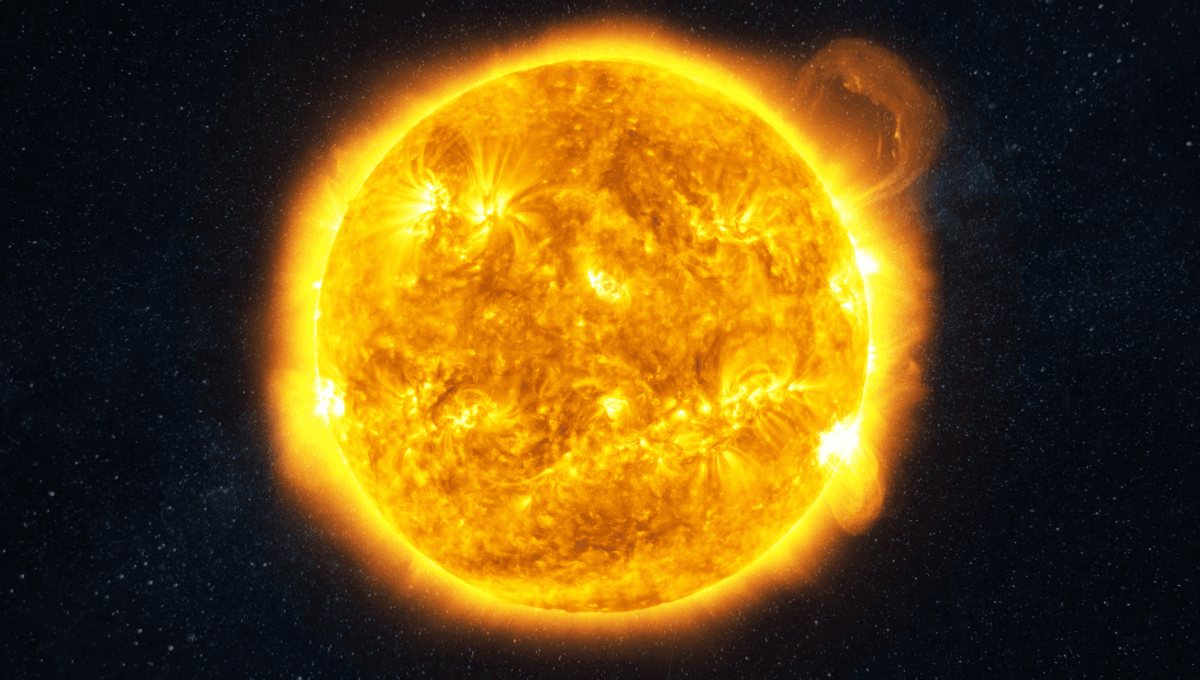Project Hail Mary Trailer First Look: What Would Happen If The Sun Got Darker?

Project Hail Mary Trailer First Look: What Would Happen If The Sun Got Darker?
As nightmare fuel goes, the movie adaptation of The Martian author Andy Weir's Project Hail Mary is really up there: Waking up alone (well, almost) on a spaceship that’s light-years from home with almost no memories except that when you left Earth, it was in dire trouble. It doesn’t really get much worse, does it? Here, we share the first trailer for the movie and dive into the science behind the sci-fi.
We won’t give too much away about the epic sci-fi flick set to hit the silver screen on March 20, 2026, but the novel kicks off the adventure with a strange celestial occurrence: the Sun is getting darker, and if it does, humankind will die. Certainly sounds very scary, but is such a thing ever likely to happen? Global dimming refers to the way that different influences (be they caused by natural particulate matter in the atmosphere, including clouds, or human intervention) can lessen the amount of sunlight hitting Earth’s surface. Some have suggested it could have perks for the climate crisis, as we saw the average temperature dip by 0.5°C (0.9°F) for over a year after Mount Pinatubo erupted in the Philippines in 1991. However, it was not met with much encouragement from the academic community. Sixteen scientists penned an open letter (that was signed by hundreds) to express their concerns over this kind of geoengineering, including uncertainty as to the effect it could have on weather, agriculture, and our general capacity to keep ourselves fed and watered. So, although a warming Earth does have many problems, we still need the Sun to survive, and even a small dip could be fatal. In the novel Project Hail Mary, the global scientific community finds themselves facing a theoretical dip in luminosity of 1 percent in five years, going up to 5 percent in 20 years. "That would mean an ice age," says Ryland Grace, the science teacher-turned-astronaut played by Ryan Gosling in the movie. "Like... right away. Instant ice age." Sudden and extreme changes in weather. Crop failures. Mass starvation. Basically, all of the bad stuff. So, what do we already know about changes to the Sun’s luminosity? And how can we be so sure that an abrupt dip in luminosity couldn't happen? According to Lucie Green, Professor of Physics at University College London, the Sun’s luminosity really doesn’t change much at all. The total solar irradiance is only slightly variable, with the variability being a results of changes during the Sun’s 11-year sunspot cycle. Prof Lucie Green “The total solar irradiance (TSI) is only slightly variable, with the variability being a result of changes during the Sun’s 11-year sunspot cycle,” she told IFLScience. “Total range of variation is ~0.1%, with TSI being at a maximum at sunspot maximum (but when there are large sunspots the total solar irradiance may dip by 0.25%).” As brightness goes, it’s pretty impressive, but there are stars out there that are millions of times brighter than our Sun, as demonstrated by the Hertzsprung-Russell diagram. However, it comes with a trade-off. “The Sun is a middling bright star if compared to other stars on the hydrogen burning main sequence,” Associate Professor of Astrophysics at Imperial College London, Dave Clements, told IFLScience. “High mass stars can be much more luminous - up to 10,000 solar luminosities, though they also have much shorter lives.” “Lower mass stars can be a lot less luminous, as little as 1/10000th the luminosity, but they also have much longer lives. Stars that have run out of their hydrogen fuel and so have left the main sequence can be even more luminous, but these late stages in the lifetime of a star don’t last very long.” Ryan Gosling, aka Ryland Grace, putting the "not" in astronaut from March 20, 2026. Image credit: Amazon MGM Studios The good news is that, at time of writing, there’s no known mechanism through which the Sun could abruptly lose luminosity. Thanks to a combination of robust solar physics and decades of precise satellite measurements, we’ve got bucket-loads of data to support our theoretical expectations (that said, the Sun will die eventually). Some stars, especially those that have left the main sequence, can vary a great deal Assoc Prof Dave Clements That said, it can be a very different story for other stars. “Some stars, especially those that have left the main sequence, can vary a great deal,” explained Clements. “For main sequence stars, this variability can come from star spots, which can be much larger than those seen on the Sun, but also from pulsations. For post-main-sequence stars, these effects also apply, but much more so. And then there are the effects of companion stars for objects in binaries, which can lead to very high variability and explosive processes leading to things known as cataclysmic variables.” Of course, none of this accounts for the out-of-this-world discovery that kicks off the peril in Project Hail Mary, and we can’t wait to watch Grace's calamitous adventure unfold in cinemas on March 20, 2026.Blocking out the Sun
Losing luminosity: Well-documented, but barely noticeable

Are there stars that experience greater variances in luminosity?


